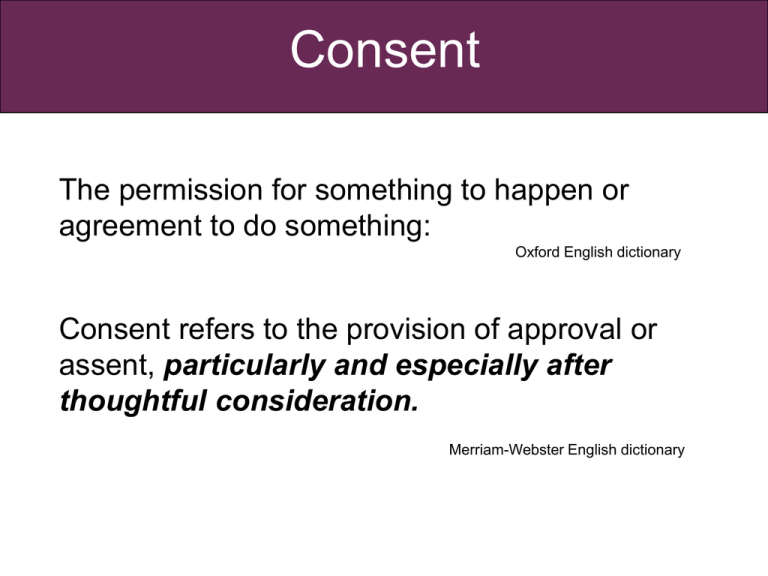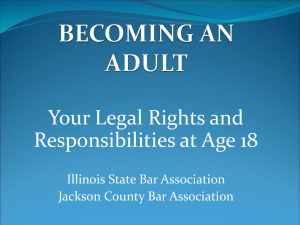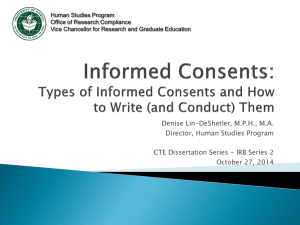informedconsentjune2.. - What is the Forum of Mobility Centres?
advertisement

Consent The permission for something to happen or agreement to do something: Oxford English dictionary Consent refers to the provision of approval or assent, particularly and especially after thoughtful consideration. Merriam-Webster English dictionary Aspects of consent Implied Consent: This a controversial form of consent which is not expressly granted by a person, but rather inferred from a person's actions and the facts and circumstances of a particular situation (or in some cases, by a person's silence or inaction). Expressed consent: This may be given in verbal, nonverbal or written form and is clearly and unmistakably stated. Verbal Consent: Is given by using the spoken word. Nonverbal Consent: This is given by using nonverbal means. Problems with Consent in Driving Assessment Validity of consent For consent to be valid it must be given voluntarily by an appropriately informed person who has the capacity to consent to the intervention. It must be given without influence being placed upon the person to either accept or refuse the intervention. To give valid consent the person needs to understand the nature and purpose of the procedure. Any misinterpretation of elements will invalidate the consent. Problems with Consent in Driving Assessment Coercion by a third party. • Employer referrals • Referral by a spouse/family member • Referral by case managers/solicitors • Medical referrals • DVLA Problems with Consent in Driving Assessment Capacity of the individual to provide consent The Mental Capacity Act 2005 defines a person who lacks capacity as a person who is unable to make a decision because of an impairment in the functioning of mind or brain. A person lacks capacity if: They have an impairment or disturbance (for example disability, condition or trauma or the effects of drugs or alcohol) that affects the way the mind or brain works and that impairment or disturbance means that they are unable to make a specific decision at the time it needs to be made. Problems with Consent in Driving Assessment Provision of information relating to the assessment. Although informing people of the nature and purpose of the intervention enables valid consent to be given this is not sufficient to fulfil any legal duty of care to the individual. Failure to provide other relevant informaation may render the practitioner liable to an action for negligence if the person suffers subsequent harm. Following Chester vs Ashar it is advisable that healthcare professionals give information about all significant possible outcomes and make a record of the information given. Questions we Asked Ourselves Relating to Assessment and Consent • Has the person received sufficient information? • Have they had time to consider the information? • Has the client sufficient understanding of the assessment process and implications? • Is consent given voluntarily? • Is the consent documented? • Who is seeking the consent? • When is consent sought? • Does the client understand that they can withdraw their consent at any point? Resources • Reference Guide to consent for examination or treatment http://www.dh.gov.uk/prod_consum_dh/groups/dh_digitalassets/docu ments/digitalasset/dh_103653.pdf • Consent To Treatment NHS choices www.nhs.uk/conditions/Consent-to-treatment • GMC consent guidance - http://www.gmcuk.org/static/documents/content/Consent_0510.pdf • 12 Key points on consent: the law in England http://www.dh.gov.uk/prod_consum_dh/groups/dh_digitalassets/@dh /@en/documents/digitalasset/dh_075159.pdf Thank You Driving Assessment Team Wrightington Mobility Centre Tel. 01257 256409 Email: barry.clift@nhs.net











